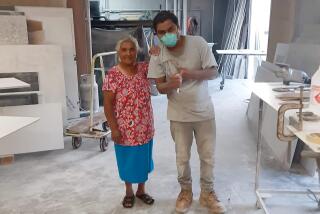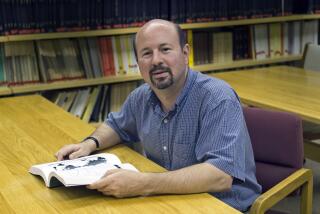Money, Medicine Mix in Breast Implant Debate : Research: Doctors take sides in the argument over silicone. Fees raise the appearance of conflicts of interest.
- Share via
BOSTON — Some doctors say silicone breast implants are perfectly safe. Others argue they make women sick. But on this they can all agree: The money for offering these opinions is excellent.
“This has been a growth industry for rheumatologists,” said Dr. Bruce Cronstein.
Himself included.
This New York University Medical Center specialist, like many prominent in rheumatology, has chosen sides in the breast implant controversy.
Cronstein happens to be a consultant for Dow Corning, the biggest maker of silicone breast implants. Many of his colleagues have joined the other team, working for the plaintiff attorneys suing Dow Corning and other manufacturers.
No one denies these doctors believe in their positions, whether for implants or against. But accepting fees that range from $300 to $600 an hour at least raises the appearance that money might influence opinions.
The scientific data about silicone’s health effects are murky, and although there is no clear evidence that implants are harmful, no one can say beyond all possible doubt that they are completely safe, either.
A definite answer is obviously important to the estimated 1 million American women who have had their breasts enlarged or replaced with silicone.
But many worry the issue will never be settled, in part because so many of the researchers who could divine the answer appear to have a financial stake in the outcome: Their research, no matter what they find, will be tainted by the suspicion of bias.
“The money involved is so big that it’s really almost impossible on either side to find anybody who is totally clean,” said Dr. Stuart Silverman of UCLA, who treats patients sent by attorneys. “I don’t know anyone who could do the research who is neutral.”
For their part, doctors often say they enjoy the intellectual challenge of expert testimony or see a civic duty to educate lawyers and juries.
“It’s important that first-class scientists be able to present material in a courtroom in a way that the public can understand,” said psychiatrist James Hudson of McLean Hospital in Belmont, Mass., a witness for Dow Corning.
Some deny money is even a factor.
“I don’t believe any of the people involved are doing this for financial reasons,” said Dr. Luis Espinoza of Louisiana State University, who works with plaintiff attorneys. “We are involved, pro and con, because we feel it’s right.”
Doctors profit from their relationships with lawyers by accepting consulting fees to review medical reports, by testifying in court and by relying on them to send in patients. Whether they form these alliances for the money or not, the resulting work can represent a sizable part of some doctors’ income.
Hudson, for instance, testified that $189,000 of his $232,000 total income in 1993 came from consulting for attorneys, mostly in breast implant cases.
Some doctors specialized in filling out paperwork for women who want to be included in a $4.25-billion settlement. In a trial last year, Dr. Nachman Brautbar of USC said he has seen about 1,000 of these patients and typically charges $950 for consultation and legal papers, which adds up to nearly $1 million.
“If you have $4.25 billion flying around, it will stick to a lot of fingers. That’s what I see happening,” said Dr. Marcia Angell, executive editor of the New England Journal of Medicine.
In fact, $4.25 billion is just the start of it. Without admitting wrongdoing, the manufacturers agreed to pay that much to settle the thousands of lawsuits filed after the U.S. Food and Drug Administration took silicone implants off the market three years ago.
About 350,000 women have registered for the settlement, most of them in the event they get sick during the next 30 years. Perhaps 8,000 to 11,000 more are suing the companies on their own.
In two jury verdicts this year, one woman was awarded $5.2 million and the other $6 million. The companies’ total liability from the remaining suits could be billions more.
At trial, the testimony of doctors and the weight of published medical research are crucial, so lawyers try to line up the best experts they can afford. The list of manufacturers’ experts adds up to more than 175 names, including prominent physicians at Johns Hopkins, Duke, Baylor and Georgetown.
Some question, however, whether doctors conducting seemingly evenhanded studies of silicone’s effects, often with federal research dollars, should ever get cash from lawyers for manufacturers or plaintiffs.
“I firmly believe that anyone who is doing science that is financed by public money cannot take a stance in that kind of adversarial role,” said Dr. Norman Anderson of Johns Hopkins University. “Otherwise, they are violating the public trust and the ethics of science.”
Proving that these conflicts of interest actually bias results is difficult, although a recent review of published breast implant reports by Britain’s Medical Devices Agency complained that “in some cases, careful analysis appears to have been set aside in favor of the defense of an entrenched position.”
Some worry that even the most ethical might subconsciously design research and analyze results so they reach the conclusions that help their team.
“If you’re on the plaintiff side, you will ask questions that, if positive, will support that. If you’re trying to disprove an association, the questions are different. It does influence the science,” said Dr. Ralph Schumacher of the University of Pennsylvania.
Some attorneys believe that simply serving as a paid expert can harden opinions and close minds. During questioning, lawyers often force these witnesses into an intellectual corner, forcing them to take the strongest possible positions and leaving little room to admit doubt.
Paid experts are especially valuable in court when they can point to silicone studies they have gotten published in prestigious journals. Attorneys use these studies as ammunition to build up, or tear down, the case that silicone caused plaintiffs’ illnesses.
Those who produce studies suggesting implants are bad, however, complain that they have a hard time getting them published.
“There is a bias among most physicians that this is a bogus illness,” said Dr. Gary Solomon of the Hospital for Joint Diseases in New York City.
“Lawyers serve their clients’ interests by finding medical professionals who will substantiate their case,” said Dr. Bruce Cunningham, a plastic surgeon at the University of Minnesota. “Rheumatologists see patients who have been steered to them. The hypothesis (that silicone is bad) is already built into the deal.”
Indeed, some lawyers locate breast implant clients by running ads with headlines such as “$100,000.00 OR MORE MAY BE OWED YOU!”
“I get calls from women who say, ‘Where do I pick up the money? I have implants.’ The ads as much as say that,” said Sandy Finestone of the Women’s Implant Information Center.
Some women with implants clearly are sick, although this does not necessarily mean implants are to blame. But with big money in the air, some may be willing to embellish their symptoms if they think it will help them win money.
“If the attorneys are the major source of patients, there is a pre-selection that can skew results,” said Anderson of Johns Hopkins.
More to Read
Sign up for Essential California
The most important California stories and recommendations in your inbox every morning.
You may occasionally receive promotional content from the Los Angeles Times.













